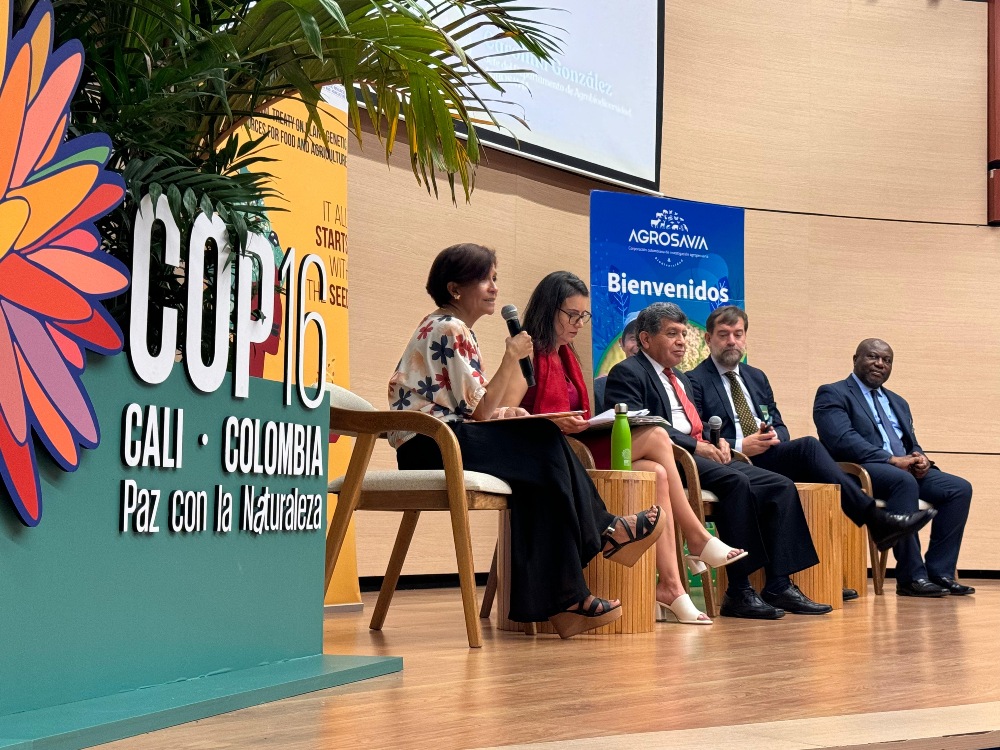- The adhesion of our country to this International Agreement that promotes the conservation and sustainable use of seeds that are key to food security was announced on the second day of COP 16.
Cali, Valle del Cauca. October 22, 2024 (@MinAgricultura). Colombia became the 153rd International Treaty on Plant Genetic Resources for Food and Agriculture (ITPGRFA) member. This Treaty already includes countries such as Japan, Austria, Belgium, France, Egypt, Denmark, the United States, Switzerland, the United Arab Emirates, and Canada, among others, including those of the Andean Community.
By joining this international instrument, Colombia ratifies its commitment to agricultural biodiversity and food security since global genetic diversity for food crops is accessed and shared by being part of this group.
The announcement was made during the forum 'ITPGRFA, a tool to make progress in the implementation of the objectives of the Convention on Biological Diversity,' moderated by Carolina González, Head of the Department of Agrobiodiversity of AGROSAVIA, which included top-level panelists such as Kent Nnadozie, Secretary of the International Treaty on Genetic Resources of the FAO; Roger Becerra, Specialist in Genetic Resources at INIA - National Institute of Agrarian Innovation of Peru; Carolina Navarrete Frías, Senior Advisor on Environmental Policy and Biodiversity of the Alliance of Bioversity and CIAT, and Mauricio Parra, Associate Professor of the Faculty of Agricultural Sciences, of Universidad Nacional de Colombia.
For the Minister of Agriculture and Rural Development, Martha Carvajalino, "the adhesion of Colombia to the TIGRFA means to consolidate the Comprehensive Rural Reform, because it is not only about distributing land equitably and fairly but also about distributing that valuable resource that the seed is. Our farmers, ethnic populations, and indigenous communities know the value of the seed, which is why they have been able to conserve them until they are given a sustainable use."
For his part, Kent Nnadozie pointed out that "By ratifying the Treaty, Colombia strengthens its international commitment to the conservation of biodiversity and can implement a new political and legal framework to sustainably use the genetic resources of the crops that form the basis of the global family basket and that are essential to achieve global food security and climate resilience."
Importance for Colombia
Colombia's adhesion to the ITPGRFA will allow preferential access to seed varieties from the countries that are members of the Treaty, enabling cooperation and exchange between countries with different environmental contexts, thus achieving the development of varieties adapted to local conditions.
The cooperation and facilitated exchange promoted by the Treaty becomes even more critical when facing challenges such as malnutrition, climate change and variability, low productivity, pests or diseases, and high production costs.
Likewise, the Treaty encourages the development of the peasant and family economy, promoting collaborative research between indigenous communities and research centers.
In addition, Colombia could receive resources from the Benefit-sharing Fund and participate in technology transfer and capacity-building programs through high-impact projects in agricultural communities, which could translate into crop improvement and, consequently, greater food security and profitability.
Carolina Navarrete Frías highlighted, "Colombia will be able to benefit from international instruments that leverage equitable and sustainable rural development in our country. We hope to continue supporting the National Government in terms of legislative innovation and the implementation of the Treaty to continue positioning the country as a world agri-food power."
For his part, Jorge Mario Díaz, Executive Director of AGROSAVIA, said that "thanks to the perseverance of the National Government and the support of FAO and the Alliance of Bioversity International and CIAT, the ratification of the ITPGRFA has been achieved, a key agreement for the conservation and sustainable use of plant genetic resources at a global level. This Treaty is essential to protect and promote the exchange of seeds, which are the basis of agricultural biodiversity and food security. In addition, it guarantees that the communities that are custodians of their seeds actively participate in constructing sustainable and resilient agricultural systems."
- More information here:
- Ivan David Alba Hidalgo
- Communications, Identity and Corporate Relations Professional
- Headquarters
- Communications, Identity and Corporate Relations Advisory Office
- ialba@agrosavia.co
- AGROSAVIA





